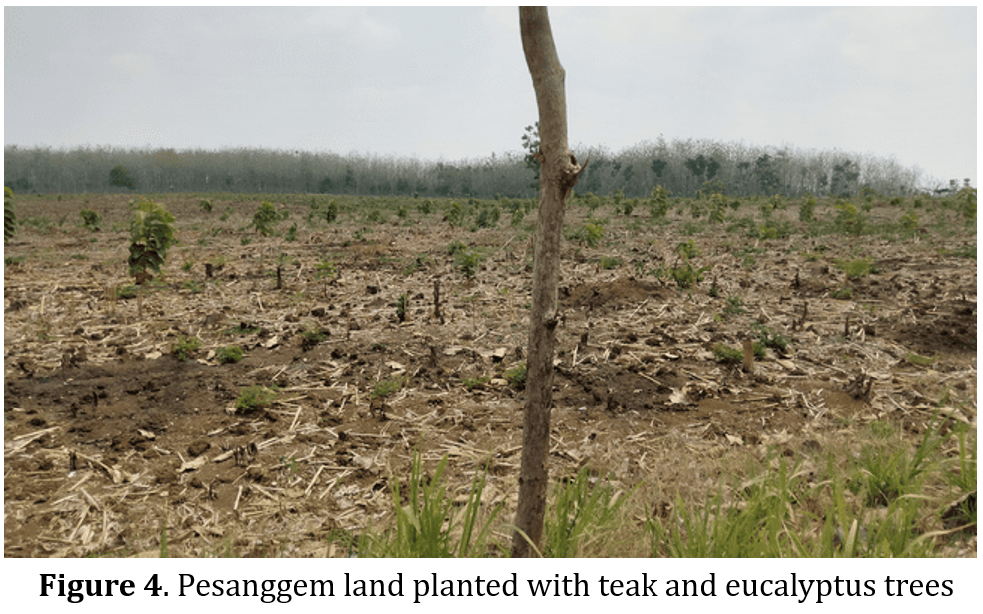Ethnoecology: The Community Adaptation Patterns of Forest Management in Grobogan Central Java

Downloads
The aims of this research are to describe community adaptation patterns and determine community perceptions regarding forest environmental management. This qualitative research was studied using an ethnoecological approach with the research focus being the people of the Perhutani area of Grobogan Regency. This research carried out the data collection through interviews, observation and documentation, with the main informant being Pesanggem as a forest land manager. This research produced the first findings in the form of community adaptation patterns in managing the environment covering three aspects, namely ecological adaptation, economic adaptation and social adaptation in the Pesanggem community in Gedangan Village, Wirosari District under the auspices of BKPH Sambirejo. 1) Ecological adaptation in Pesanggem showed the availability of well water which previously only relied on rainwater, then adjustments to various types of plants, as well as an understanding of prohibitions and sanctions for illegal activities in forest areas; 2) economic adaptation showed an increase in income for Pesanggem from forest land management; 3) social adaptation showed the existence of cooperation between members and other farmer groups within the LMDH forum. The second finding is that the public's perception in interpreting environmental management is that there are 5 values, namely the values of wisdom, independence, religion, creativity and healthy living. Based on the research results, the author recommends that forest area communities be involved in managing and guarding forests for generational sustainability, and Perum Perhutani should invite partners from surrounding school institutions as a means of educating generations in joint forest management.
Alfiyanti, N., & Lestari, P. (2022). Analisis nilai-nilai kearifan lokal masyarakat kandri kecamatan Gunung Pati sebagai alternatif sumber belajar Ips di Smp Negeri 22 Semarang. Sosiolium: Jurnal Pembelajaran IPS, 4(1), 15–20. https://doi.org/10.15294/sosiolium.v4i1.53155.
Anggiani, P., & Hikmawan, M.D. (2022). Dinamika kemitraan antara perum perhutani dengan Lembaga Masyarakat Desa Hutan ( LMDH ) dalam pelestarian hutan mangrove di Pulo Cangkir Kabupaten Tangerang. Journal of Social Politics and Governance (JSPG), 4(2), 112–127. https://doi.org/https://doi.org/10.24076/jspg.v4i2.936.
Efriani, E. (2020). Adaptasi ekologi penduduk transmigrasi di Desa Rasau Jaya Satu. Pangadereng : Jurnal Hasil Penelitian Ilmu Sosial Dan Humaniora, 6(1), 1–12. https://doi.org/10.36869/pjhpish.v6i1.124.
Fatimatuzzahro, U., & Indawati, Y. (2023). Penegakan hukum dalam menanggulangi tindak pidana illegal logging (studi kasus di perum perhutani Jawa Timur). Jurnal Politik Hukum, 1(1), 26–38. https://jurnal2.untagsmg.ac.id/index.php/jph/article/view/406.
Gorda, A.N.E.S., & Wardani, D.K.A. (2020). Refleksi nilai kearifan lokal masyarakat Hindu Bali dalam pengelolaan lingkungan. ETTISAL : Journal of Communication, 5(1). https://doi.org/10.21111/ejoc.v5i1.3998.
Hilmanto, R. (2010). Etnoekologi. In Perpustakaan Nasional RI: Katalog Dalam Terbitan (KDT). Universitas Lampung.
Nurhayati, I.K., Brata, N.T., & Rochana, T. (2017). Etnoekologi masyarakat penambang emas di Desa Cihonje Kecamatan Gumelar Kabupaten Banyumas. Solidarity: Journal of Education, Society and Culture, 6(2), 156–166.
Isdianto, A., & Luthfi, O.M. (2020). Persepsi dan pola adaptasi masyarakat Teluk Popoh terhadap perubahan iklim. Jurnal Ilmu Kelautan SPERMONDE, 5(2), 77. https://doi.org/10.20956/jiks.v5i2.8935.
Kewengian, G.P. (2019). Partisipasi masyarakat dalam pengelolaan dan pelestarian lingkungan hidup. Lex Et Societatis, 7(5), 55–62. https://doi.org/https://doi.org/10.35796/les.v7i5.24723.
Khaerudin. (2022). Perum Perhutani Kesatuan Pemangkuan Hutan (KPH) Gundih. Perhutani. https://www.perhutani.co.id/tentang-kami/struktur-organisasi/divisi-regional/jateng/kph-gundih/.
Konstantinidis, E., Harman, J.L., & Gonzalez, C. (2022). Patterns of choice adaptation in dynamic risky environments. Memory and Cognition, 50(4), 864–881. https://doi.org/10.3758/s13421-021-01244-4.
Kristiawan, N. (2017). Pola adaptasi ekologi budaya tiga komunitas di Jambi. Bhumi, 3(November), 189–200. https://doi.org/https://doi.org/10.31292/jb.v3i2.124.
Meng, W., Ran, J., Dai, Q., Tu, N., Leng, T., & Ren, Q. (2023). Morphological and physiological adaptation characteristics of lithophytic bryophytes to karst high calcium environment. BMC Plant Biology, 23(1), 1–19. https://doi.org/10.1186/s12870-022-03980-4.
Peters, SJ. (2015). A democracy’s college tradition. In H.C. Boyte (ed.), Democracy’s Education: Public Work, Citizenship, and the Future of Higher Education (Nashville, TN: Vanderbilt University Press), pp. 44-52.
Putri, B.S., & Subekti, R. (2022). Upaya pencegahan dan pemberantasan perusakan hutan oleh perum perhutani Kesatuan Pemangku Hutan (KPH) Mantingan. Jurnal Pendidikan Kewarganegaraan Undiksha, 10(1), 328–335. https://doi.org/https://doi.org/10.23887/jpku.v10i1.44216.
Sari, I.A., Sulistijorini, & Purwanto, Y. (2020). Studi etnoekologi masyarakat adat Trah Bonokeling di Banyumas dan Cilacap. Ilmu-Ilmu Hayati, 19(1). https://doi.org/10.14203/beritabiologi.v19i1.3785.
Situmorang, M.T.N., & Noviana, L. (2022). Peningkatan pendapatan masyarakat dan pelestarian hutan melalui program pengelolaan hutan bersama masyarakat. Arus Jurnal Sosial Dan Humaniora, 2(2), 68–75. https://doi.org/10.57250/ajsh.v2i2.68.
Sulaeman. (2016). Komunikasi lingkungan: fenomena hutan Suku Naula di Pedesaan. LP2M IAIN Ambon.
Supangat, A.B., Purwanto, Hendrayana, H., & Riyanto, H.D. (2022). Springshed protection planning for combating drought in Grobogan District, Central Java. IOP Conference Series: Earth and Environmental Science, 1016(1). https://doi.org/10.1088/1755-1315/1016/1/012022.
Triyanti, A., Indrawan, M., Nurhidayah, L., & Marfai, M.A. (2023). Community-Based Fire Management and Peatland Restoration in Indonesia. In Environmental Governance in Indonesia (pp. 135-150). Cham: Springer International Publishing. https://doi.org/10.1007/978-3-031-15904-6_8.
Wijayanti, A.R.Y., Arafat, A., & Irlan. (2022). Pola adaptasi masyarakat dalam Pengelolaan Hutan Kemasyarakatan (HKM) di Desa Mirring, Kabupaten Polewali Mandar, Sulawesi Barat. Jurnal Hutan Dan Masyarakat, 14(2), 88–98. https://doi.org/10.24259/jhm.v14i2.21391.




